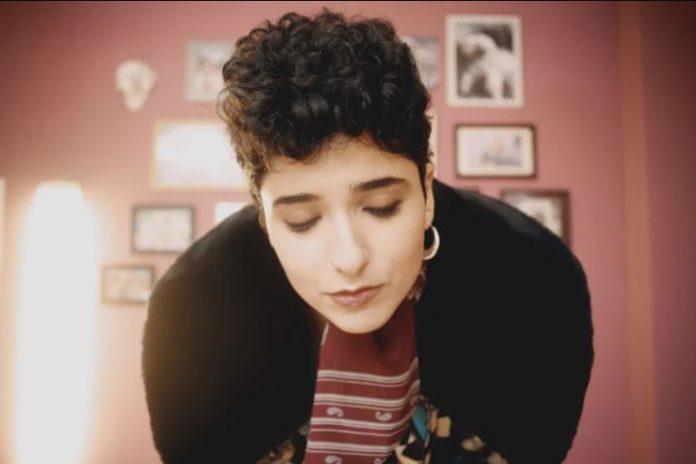Amsterdam: In May 2019, life looked good for Palestinian singer-songwriter Rasha Nahas. He had started to establish himself in Berlin — moved there from his hometown of Haifa in 2017; Her debut album — wrapped in 2018 — was just weeks away from being released; And he lined up for a possible tour of the Middle East and Europe.
“I feel like a lot of exciting things are happening and hopefully the album will bring more,” she told me then. “I’m not in a hurry, but I’m going to have absolute strength with all of my will and passion.”
Fast forward to today and that debut album is still just weeks away from release. Shortly after talking last year, Nahas began to experience pain in his wrists and hands. It quickly became quite serious that she was seeing a doctor who diagnosed her with repetitive stress injury.
Also Read: Kartik Aaryan reiterates importance of wearing mask at work
“It was really hardcore,” she says. “Both my hands and wrists had very, very bad swelling. I couldn’t type emails or hold my phone or carry groceries and accessories. It was basically from overplaying. It had been a very busy time with the show and the trip, and a lot of stress. It was good, in some ways, because it meant things were happening to me, but mental stress wasn’t too good for my body. I just had to stop everything, take a break and focus on getting better.
Having psyched herself for the release of her album, the necessary postponement — and canceling her tour plans — was something of a comedown.
“Everything was a big frustration,” she says. “And I couldn’t really give that energy out in music, because I wasn’t able to (play).”
That last part, in particular, was a huge blow for someone for whom music has been “a place of escape and expression and dealing with things and understanding myself” since her early teens and the thing from which she makes her stay — has become an impressive achievement for any artist, but especially an independent musician from the Middle East.
Nahas first picked up a guitar when he was a kid. It really stopped her sister, who “took some lessons then.”
I would tune it in very funny ways and sing it out of the and tune, she says. “So I decided to study the guitar. The only available option my parents liked was classical music. So for nine years I did classical guitar and theories. I wanted to leave it (often), but I’m glad I didn’t.
Music was popular in the Nahas house – from classic Arab artists including Faraj (“A big fan of my mother”). Nahas mostly decided to listen later. “We had a huge collection of CDs in the car and every Saturday we’d open windows and drive to Galilee with very fresh air and listen to John Lennon. This is my main memory of music since my childhood,” she says. As a teenager he branched out into hard rock, pop, jazz and more. Oh, and Avril Lavigne (“It’s a little embarrassing now,” she admits).
She says that she wrote her first original song at the age of 15. “It probably sounded like a normal indie-rock song, but I think the (lyrical) material was quite different,” she says. “It was about life as a Palestinian girl, understanding her identity, and asking questions – also about the political situation. Looking at it now, I think, now wow! 15 years old. At the age I was doing the same thing?
However he felt that it took a few years to develop his identity as an artist. She played her first gig after completing high school at the age of 18, by which time she had about an hour of original material.
It makes sense that Nahas underwent classical training and listened to a wide variety of genres extensively – and she professionally produces music for the theater. Her songs, and especially her vocal delivery, have a certain dramatic vibe, and are indicative of many influences – pop, indie rock, jazz, rockabilly, surrealism, punk, dialect, and more. The result is something that seems completely organic and completely honest. It is not necessarily easily accessible, but it is certainly the most interesting work you hear from a contemporary Middle Eastern artist, at least in the English language.
Two singles released so far from albums — “Joker” and title track “Desert” — are good examples; Both showcase their distinctive style. The former moved to Berlin a month after Nahas was written at the age of 21 (because “I just need to get away, make music and take the time to just be and understand things”). “It came from the idea that a few days of collecting and piling — about being away from home, about artists getting on stage and getting labeled as Palestinians or as Israelis, about the political situation that never really leaves you.”
The latter, which was released in November, was written around the same time. “It’s a very personal song talking about discovery and the things that are changing around us,” explains Nahas. “In the video (shot in Haifa), we played a lot with metaphors and images — we are children with guns, we embodies country ties to an olive dancer crucified on the tree. We have an old, abandoned building in Haifa that contrasts with large glass buildings to ask ourselves, where our identity – as palestinian 48ers – fits between tradition and modern colonialism.
Also Read: The best dressed celebrities on the Cairo International Film Festival 2020 red carpet
Discovery of identity is a central theme of Nahas’ debut album, which will eventually see the light of day on 29 January. “It was heavily influenced by the transfer from Palestine to Germany,” she says. “It therefore speaks of questions of identity and our responsibility towards our identity. I come from this place which traditionally has a certain political weight. So how do I deal with that weight? How do i sing about it? Who am i in ”
The end of the record’s long delay would undoubtedly be a major relief to Nahas, who then described it as “one of the heaviest years for me”. Her nearly complete recovery from the injury was accompanied by the onset of the COVID-19 epidemic, and that year included the death of a close friend – one of the dancers in the “Desert” video.
“That challenged my relationship with (the record). He was part of the creation in a way. And the release was postponed because of injury and epidemic. I wished it was finished and he could see it, because he really put everything in it. So it just added another layer to everything.
That heavy year hasn’t been entirely without the positive, though, he stressed. “Although it’s been very upsetting, with my injury and epidemic, it had some ground in me. It forced me to look more inward, but also look at what’s around me and appreciate it and grow from it.
Given the years between the album’s completion and release, I wonder if Nahas is still attached to the work. The answer is definite yes.
Also Read: What We Are Reading Today: The Autocratic Middle Class by Bryn Rosenfeld
“It marks a period in my life that I needed to capture and I’m really happy that I did it. The songs have come from a very honest place. That’s the most important thing – I feel like she’s not old. Hui, “she says.” So, it doesn’t matter when it comes out, because it’s real and it’s true – and I’m sure it will be reflected in conversations with the people who are going to listen to it. ”




